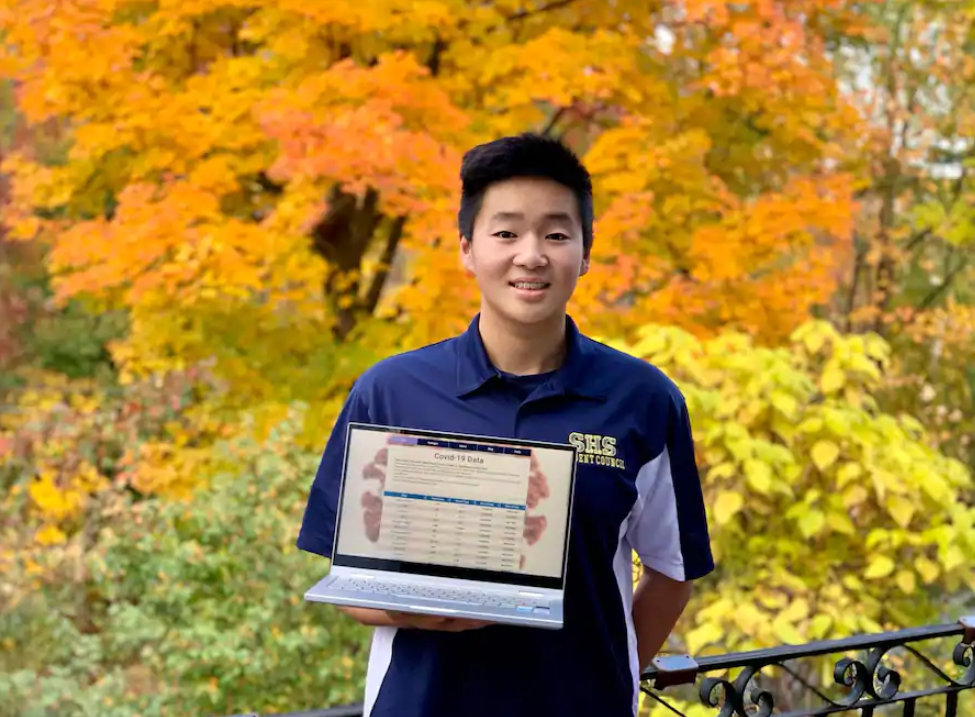15-year-old William Wu started the site in late August.
When William Wu’s older sister left for her freshman year at Georgia Tech in August, the 15-year-old from Shrewsbury, Mass., noticed that his mother spent a good amount of time looking at the university’s covid-19 dashboard. The numbers, big or small, gave her some peace of mind.
Wu wondered if similar information was available for public high schools. He was about to begin his sophomore year at Shrewsbury High with a hybrid learning model, featuring two days of in-person learning per week, and thought it could be useful to know how many cases derived from schools in other states.
He checked states’ websites and called health departments to gather numbers. Wu figured if he could organize them all in one place it would be a valuable resource for students and parents across the country.
“I wanted to get the data out there and make the site a stable source of information,” he said.
Early on, he wasn’t able to collect much. Many states didn’t respond to his queries or told him they weren’t ready to make that information available. But by mid-September, more dashboards and Excel sheets became available and Wu began to put the numbers in one place.
His website now features case numbers for 28 states, mostly for K-12 schools. For six states, Wu has the number for K-12 schools and public colleges. Each state has its own page describing its criteria for inclusion, and some feature a breakdown by district or individual school.
Americans have been presented plenty of large numbers over the past seven months and Wu acknowledges it can be hard to comprehend their magnitude. But he believes there is power, and some comfort, in staying informed.
“Numbers are better than nothing,” he said. “If you really sit down and think about them, sometimes you can get a sense of what they truly mean.”
Since his school shut down in mid-March, Wu found it hard to sit on the sidelines as people across the country faced pandemic-related issues. Soon after the shutdown, he and his sister, Athena, started a fundraiser for their local hospital, UMass Memorial, to help provide personal protective equipment. Their GoFundMe raised more than $2,500.
He spent the summer hanging around the house, working out and trying to develop new skills. He learned to garden, bake and cook. He found the new activities to be distracting and relaxing. But now, as he scours the Internet for the updated numbers each day, the mood is more serious.
“The numbers can get overwhelming,” he said. “But it’s important to get this information out for people who want it. Although a little bit of sticking your head in the sand sometimes isn’t a bad thing, it’s still important to stay informed every once in a while.”
Since launching the website, he has received helpful tips and encouraging feedback from a number of visitors. As more states release information and bring students back to school, his list of statistics grows. But he also faces criticism from those who don’t believe the project is worthwhile or well-intentioned. Wu said he has also received emails that focus on his race.
“I expected a little bit of a downside to the work that I was doing,” he said. “But to be honest I didn’t expect it to come this soon and this fast. It came within a couple of hours after my website was launched. It doesn’t feel good when people start criticizing you, not for your work but for other reasons.”
He doesn’t plan to let it stop him from updating the site. In the spring, he was surprised to see how easy it was to raise money for the hospital. He’s excited about helping others.
“[This site] helped me to realize how much I can actually do,” he said. “And it showed me how much potential each person has to make an impact and affect the world in a positive way.”
Article Credit: washingtonpost
